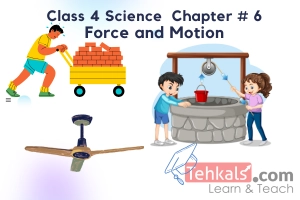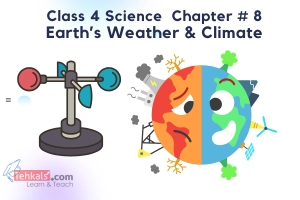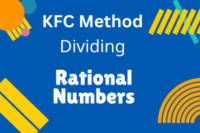Class 4 Science MCQs Chapter 7
Published: 2 Oct 2022
Welcome to tehkals.com, your go-to destination for Class 4 Science MCQs Chapter 7. Explore our comprehensive collection of Class 4 Science MCQs of Chapter No. 7, focusing on “The Earth and its Resources.”
If you want to succeed and clear your PST, CT, DM, PT, CT, TT, SST, and SS Tests, then our comprehensive MCQs (Multiple Choice Questions) provide the perfect solution by giving the treasure of knowledge and bank of MCQs.
Class 4 Science MCQs Chapter 7
The Earth and its Resources
Chapter No. 7 Test # 1
1. The basic material that humans get from land, sea or air is called _______resources.(a) Artificial
(b) Natural
(c) Metal
(d) None of these
Show Answer
Natural
2. About ______ of the land is cultivated in the world.
(a) 9 %
(b) 10 %
(c) 11 %
(d) 14 %
Show Answer
11 %
3. In the globe of earth, green or light brown indicates ______
(a) Water
(b) Land
(c) Desert
(d) Mountains
Show Answer
Land
4. About _______ of the Earth’s surface is covered by water.
(a) 71 %
(b) 29 %
(c) 11 %
(d) 97 %
Show Answer
71 %
5. About ________ of the Earth’s surface is land.
(a) 71 %
(b) 29 %
(c) 11 %
(d) 91 %
Show Answer
29 %
6. Air is present even in ______
(a) Earth
(b) Soil
(c) Water
(d) All of these
Show Answer
All of these
7. About ______ of water on the Earth is in the oceans.
(a) 71 %
(b) 29 %
(c) 3 %
(d) 97 %
Show Answer
97 %
8. The ______ percent of water is present in glaciers, streams, rivers and lakes.
(a) 71 %
(b) 29 %
(c) 3 %
(d) 97 %
Show Answer
3 %
9. The water from rivers and streams flow to ______
(a) Lakes
(b) Oceans
(c) Both a & b
(d) None of these
Show Answer
Both a & b
10. ______ is used to make bricks and pottery.
(a) Glass
(b) Stone
(c) Clay
(d) None of these
Show Answer
Clay
11. ______ is commonly used to make buildings and glass.
(a) Sand
(b) Stone
(c) Clay
(d) None of these
Show Answer
Sand
12. The rubber is obtained from the secretion of a ________.
(a) Black coal
(b) Artificial
(c) Rubber tree
(d) None of these
Show Answer
Rubber tree
13. All living things need water to ______
(a) Food
(b) Survive
(c) Running
(d) none of these
Show Answer
Survive
14. Running water is used to generate _________.
(a) Heat
(b) Fuel
(c) Electricity
(d) None of these
Show Answer
Electricity
15. Fast blowing air is used to generate _________.
(a) Heat
(b) Fuel
(c) Electricity
(d) None of these
Show Answer
Electricity
16. The outer layer of the Earth is called ______.
(a) Air
(b) Water
(c) Soil
(d) None of these
Show Answer
Soil
17. Soil provides essential __________ to plants for growth.
(a) Coal
(b) Fuel
(c) Nutrients
(d) None of these
Show Answer
Nutrients
18. World soil day is celebrated on________.
(a) 5th December
(b) 5thMarch
(c) 5thFebruary
(d) 5thJune
Show Answer
5th December
19. The part of the Earth that is completely covered with trees is called _____.
(a) Deserts
(b) Ocean
(c) Forest
(d) None of these
Show Answer
Forest
20. ______ not only provide us timber but are also natural habitats for animals.
(a) Deserts
(b) Ocean
(c) Forest
(d) None of these
Show Answer
Forest
21. Forest provides us ______ air.
(a) Polluted
(b) Oxygenated
(c) No
(d) Timber
Show Answer
Oxygenated
22. Forests cover _______ of the total area of Pakistan.
(a) 5.2 %
(b) 6 %
(c) 25 %
(d) 9 %
Show Answer
5.2 %
23. Pakistan’s largest natural forest is located in the city of ________.
(a) Swat
(b) Muree
(c) Ziarat
(d) None of these
Show Answer
Ziarat
24. ______ found in the underground part of earth.
(a) Filter oil
(b) Crude oil
(c) Artificial oil
(d) No oil
Show Answer
Crude oil
25. We produce kerosene, petrol, diesel, engine oil, grease, petroleum jelly and coaltar from the ______.
(a) Filter oil
(b) Crude oil
(c) Artificial oil
(d) No oil
Show Answer
Crude oil
26. Natural gas is obtained from the ______
(a) CNG stations
(b) Laboratory
(c) Artificial source
(d) Crude oil
Show Answer
Crude oil
27. Natural gas is used for:
(a) Heating and cooking
(b) Generate electricity
(c) Make fertilizers
(d) All of these
Show Answer
All of these
28. Coal is a ______ resource.
(a) Artificial
(b) Natural
(c) No
(d) None of these
Show Answer
Natural
Chapter No. 7 Test # 2
29. The second largest mine of natural salt in the world is located at ______ (PindDadan khan) in Pakistan.(a) Peshawar
(b) Lahore
(c) Khewra
(d) None of these
Show Answer
Khewra
30. ______ are simple solid chemical substances which are present in the earth.
(a) Oil
(b) Petrol
(c) Gas
(d) Minerals
Show Answer
Minerals
31. ______ are used to make wires, coins, jewelry and utensils.
(a) Oil
(b) Petrol
(c) Gas
(d) Minerals
Show Answer
Minerals
32. The imprints or remains of many organisms that do not exist in this world now are known as______.
(a) Fuels
(b) Food
(c) Fossils
(d) None of these
Show Answer
Fossils
33. Fossils are found under ______
(a) Rocks
(b) Soil
(c) Sea
(d) All of these
Show Answer
All of these
34. ______ were lizards like giant animals.
(a) Giraffa
(b) Dinosaurs
(c) Elephant
(d) None of these
Show Answer
Dinosaurs
35. Dinosaurs were present on earth ______ of years ago.
(a) Hundreds
(b) Thousands
(c) Millions
(d) None of these
Show Answer
Millions
36. Dinosaurs are now_______.
(a) In Amazon
(b) Extinct
(c) Live in high mountains
(d) None of these
Show Answer
37. The skeletons of many ancient animals are still preserved in:
(a) Soil and rock
(b) Salt reservoirs
(c) High mountains
(d) None of these
Show Answer
Soil and rock
38. _______is/are called non-renewable resources.
(a) Coal
(b) Petrol, diesel
(c) Natural gas
(d) All of these
Show Answer
All of these
39. Those resources which cannot be replaced by new ones easily are called ______ resources
(a) Renewable
(b) Non-renewable
(c) Sunlight
(d) Water
Show Answer
Non-renewable
40 Coal, petrol, diesel and natural gas take ______ of years to form
(a) Hundreds
(b) Thousands
(c) Millions
(d) None of these
Show Answer
Millions
41. Coal, petrol, diesel and natural gas are ______ resources.
(a) Renewable
(b) Non-renewable
(c) Sunlight
(d) Water
Show Answer
Non-renewable
42. Those unlimited resources which can be replaced after use are called _____resources.
(a) Renewable
(b) Non-renewable
(c) Coal
(d) Petrol
Show Answer
Renewable
43. Air, water, soil, forest and solar energy are ________resources.
(a) Renewable
(b) Non-renewable
(c) Coal
(d) Petrol
Show Answer
Renewable
44. Some renewable resources are used as ______ substitutes.
(a) Food
(b) Wind
(c) Fuel
(d) All of these
Show Answer
Fuel
45. The lavish use of natural resources is causing irreparable ______ to our environment.
(a) Benefit
(b) Damage
(c) Good
(d) All of them
Show Answer
Damage
46. Man’s careless use of natural resources is causing irreparable damage to __________.
(a) Energy
(b) Houses
(c) Environment
(d) None of these
Show Answer
Environment
47. Due to excessive use of natural resources, humans are facing problems like:
(a) Climatic change
(b) Pollution
(c) Lake of clean water
(d) All of these
Show Answer
All of these
48. Due to excessive use of natural resources, renewable resources will also run out or will become________.
(a) Useable
(b) Unusable
(c) Good condition
(d) Grow more
Show Answer
Unusable
49. All living bodies _________ on natural resources to survive.
(a) Depend
(b) Do not depend
(c) Both a & b
(d) None of these
Show Answer
Depend
50. Recycling saves natural resources by making things________.
(a) Reusable
(b) Throwing
(c) Polluted
(d) None of these
Show Answer
Reusable
51. When water falls from the sky as rain then it joins the reivers and streams that flow towards:
(a) Lakes
(b) Oceans
(c) Both a & b
(d) None of these
Show Answer
Both a & b
52. Glass Is made from:
(a) Sugar
(b) Sand
(c) Plastic
(d) Rubber
Show Answer
Sand
53. About what percentage of the Earth’s surface is land?
(a) 1 percent
(b) 21 percent
(c) 29 percent
(d) 30 percent
Show Answer
29 percent
54. Remains of dead animals and plants found in the earth are called
(a) Soil
(b) Minerals
(c) Stones
(d) Fossils
Show Answer
Fossils
55. To make things reusable is called:
(a) Recycling
(b) Conservation of resources
(c) Care
(d) Cycling
Show Answer
Recycling
56. An example of non-renewable sources is:
(a) Oil
(b) Soil
(c) Air
(d) Solar energy
Show Answer
Oil

- Be Respectful
- Stay Relevant
- Stay Positive
- True Feedback
- Encourage Discussion
- Avoid Spamming
- No Fake News
- Don't Copy-Paste
- No Personal Attacks



- Be Respectful
- Stay Relevant
- Stay Positive
- True Feedback
- Encourage Discussion
- Avoid Spamming
- No Fake News
- Don't Copy-Paste
- No Personal Attacks





